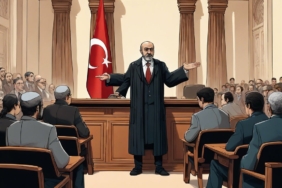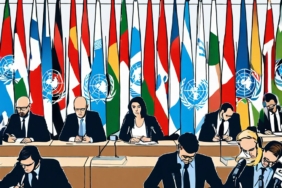International Conference on Genocide
In the session moderated by Victor Kattan from the University of Nottingham, important presentations were made by Prof. Dr. Satvinder Juss from King’s College London, Prof. Dr. Jose Manuel Barreto from Los Andes University, Assoc. Prof. Dr. Harun Halilovic from the International University of Sarajevo and Dr. Luigi Daniele from Nottingham Trent University. In this conference organized by Boğaziçi University Faculty of Law, in-depth discussions were held on the definition of genocide and its place in international law.
In his presentation titled “Defining genocide as a comprehensive state crime,” Prof. Dr. Satvinder Juss drew attention to the arrest warrant issued by the International Criminal Court (ICC) against Israeli Prime Minister Benjamin Netanyahu and voiced his criticism by stating, “The Chief Prosecutor of the ICC issued an arrest warrant against 2 Israelis and 3 Palestinians while only one side was conducting an illegal occupation.” Emphasizing that the statements of the Chief Prosecutor of the ICC regarding “Israel’s right of self-defense” ignored the foundations of the conflict, Juss said, “Issues such as apartheid or Israel’s illegal settlements were not mentioned.” Providing a historical perspective, Juss gave the example of the former jurist Raphael Lemkin’s definition of “genocide” as the destruction of indigenous peoples in India and the Americas, and made the assessment that, “Genocide continues to be remembered only with the Nazis’ genocide of the Jews; Other examples are brushed aside.”
In his presentation titled “Genocide, colonial genocide and the genocide in Gaza: Implications for international law”, Prof. Dr. Jose Manuel Barreto emphasized the Eurocentric nature of the concept of genocide. “The widespread idea of genocide is Eurocentric. “This term, developed by Raphael Lemkin in the context of Nazi atrocities, found its place in the 1948 Genocide Convention by quoting the Holocaust,” Barreto said. “The creation and legal recognition of the concept of genocide corresponds to a terrible crime committed in European geography. “This crime still occupies a central place in European and world history.” He also stated that popular cinema constantly reminds us of the genocides committed by the Nazis, but other genocides such as those in Cambodia, Rwanda and Bosnia are not deemed worthy of global artistic and political representation. Barreto stated that Western thinkers argue that an event must resemble the Holocaust in order to be considered genocide, and said, “The Eurocentric history of genocide consists of a single event, the Holocaust, which is the first and last example of its kind.” Drawing attention to the fact that Israel is an extension of the colonial use of violence by the US and European states, Barreto said, “The US and European empires that provided the planes and bombs that bombed Gaza are responsible for the genocide in Gaza.”
In his presentation titled “Srebrenica and Gaza: Thoughts and Lessons for the Prevention of Genocide,” Assoc. Prof. Dr. Harun Halilovic from the International University of Sarajevo stated that Bosnians feel a strong connection to Gaza. “People immediately added the colors of the Palestinian flag to the flower that was the symbol of the Srebrenica Genocide because we understood what was happening there,” he said. Emphasizing that preventing genocide is one of the most fundamental obligations of international law, Halilovic said, “After the adoption of the Geneva Convention, we witnessed genocide being repeated in Rwanda and Bosnia-Herzegovina.” Using the example of Srebrenica, he stated that the most important reason for the failure to prevent genocide is the dysfunctional United Nations (UN) system. Halilovic said, “This situation is related to both the decision-making mechanism of the UNSC and the failure to implement the decisions taken.” Halilovic stated that problems in international law emboldened those responsible for genocide, and said, “The perpetrators continue to commit genocide with impunity, as we have seen in Srebrenica and Gaza.” Reminding that Srebrenica was declared a “safe zone” by a UNSC decision in 1993, Halilovic said, “We see that the areas declared as so-called safe zones in Gaza are being deliberately targeted.” Halilovic assessed, “Again, when we look at the example of Srebrenica, the goal of preventing genocide cannot be achieved without a radical reform of the dysfunctional UN system.”
Dr. Luigi Daniele from Nottingham Trent University gave a presentation titled “Will there be international humanitarian law after Gaza? From the law of armed conflict to Israel’s ‘law’ of armed genocide: A global threat to civilians worldwide.” Daniele said, “Israel is seen as an exception to international law. “This situation reveals the failure of the international legal structure, despite its pathetic efforts to reshape it.” Stating that one rule of international law is to provide protection to children in conflict zones, Daniele drew attention to the fact that the number of children who have died in conflicts around the world since 2019 is higher than the deaths in Gaza. Stating that the weapons provided to Israel by the US were effective in the destruction in Gaza, Daniele said, “The US provided at least 14,000 of these weapons to an ally (Israel) that it knew would use them in areas where there are 34,000 people.” per square kilometre.” Emphasizing that civilians in Gaza were targeted, Daniele said, “Gaza is seen as a purely military target and that is why no one is safe there.” He concluded his speech by saying.

















